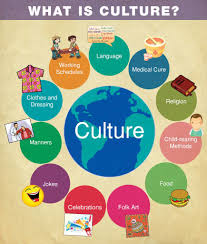The Rich Tapestry of Culture
Culture is the fabric that weaves together the diverse threads of human society, creating a rich tapestry of traditions, beliefs, values, and customs. It is the lens through which we view the world and the foundation upon which our identities are built.
Every culture is unique, shaped by history, geography, language, religion, and a myriad of other factors. From the vibrant colors of Indian festivals to the solemn rituals of Japanese tea ceremonies, from the rhythmic beats of African drumming to the intricate patterns of Middle Eastern architecture, culture manifests itself in countless forms across the globe.
One of the most fascinating aspects of culture is its ability to evolve and adapt over time. As societies interact and exchange ideas, cultural boundaries blur, giving rise to new traditions and hybrid identities. This dynamic process of cultural exchange enriches our collective heritage and fosters understanding between people from different backgrounds.
At its core, culture serves as a bridge that connects individuals and communities, providing a sense of belonging and shared history. It shapes our perceptions, influences our behavior, and defines our relationships with others. Through cultural expression in art, music, dance, literature, cuisine, and more, we celebrate our differences and find common ground amidst diversity.
As we navigate an increasingly interconnected world, it is essential to appreciate and respect the diversity of cultures that make up our global society. By embracing cultural differences with an open mind and heart, we can learn from one another, break down stereotypes, and build mutual respect and cooperation.
So let us cherish the rich tapestry of culture that surrounds us – for it is a testament to the beauty and resilience of humanity in all its forms.
The Power of Culture: 7 Benefits That Enhance Identity, Creativity, and Global Understanding
- Culture fosters a sense of identity and belonging.
- Cultural diversity promotes creativity and innovation.
- Understanding different cultures enhances empathy and tolerance.
- Cultural traditions provide a connection to the past and a roadmap for the future.
- Experiencing new cultures broadens perspectives and enriches life experiences.
- Cultural exchange encourages mutual respect and global cooperation.
- Culture is a source of beauty, inspiration, and shared human expression.
Challenges of Culture: Misunderstandings, Restrictions, and Appropriation
- Cultural barriers can lead to misunderstandings and conflicts between individuals and groups.
- Cultural norms and traditions may restrict individual freedom and expression.
- Cultural appropriation can undermine the authenticity and significance of traditional practices.
Culture fosters a sense of identity and belonging.
Culture plays a crucial role in fostering a sense of identity and belonging among individuals and communities. Through shared traditions, values, language, and customs, culture provides a framework for people to connect with their roots, understand their heritage, and form strong bonds with others who share similar cultural experiences. This sense of belonging not only strengthens individual identity but also creates a supportive community where individuals feel accepted, valued, and connected to something greater than themselves. Embracing one’s culture can instill a deep sense of pride and belonging that transcends geographical boundaries and unites people in a shared sense of history and belonging.
Cultural diversity promotes creativity and innovation.
Cultural diversity serves as a catalyst for creativity and innovation by bringing together a multitude of perspectives, experiences, and ideas. When individuals from different cultural backgrounds collaborate, they bring unique insights and approaches to problem-solving, leading to more innovative solutions and breakthroughs. By embracing diverse cultural influences, organizations and societies can foster a creative environment that encourages thinking outside the box and exploring new possibilities. This cross-pollination of ideas not only fuels creativity but also drives innovation by challenging conventional thinking and inspiring fresh perspectives on how to address complex challenges in an ever-changing world.
Understanding different cultures enhances empathy and tolerance.
Understanding different cultures enhances empathy and tolerance by allowing individuals to see the world through diverse perspectives. When we take the time to learn about and appreciate the customs, traditions, and beliefs of other cultures, we develop a deeper sense of empathy towards those who may have different experiences and backgrounds than our own. This increased empathy leads to greater tolerance and acceptance of diversity, fostering a more inclusive and harmonious society where individuals can coexist with mutual respect and understanding.
Cultural traditions provide a connection to the past and a roadmap for the future.
Cultural traditions serve as a valuable link to our heritage, offering a connection to the past that grounds us in our roots and history. By honoring and preserving these traditions, we not only pay tribute to our ancestors and their legacy but also gain insights into the values and beliefs that have shaped our identities. Furthermore, these time-honored practices provide a roadmap for the future, guiding us in navigating the challenges of modern life while staying true to our cultural heritage. Embracing and passing down these traditions ensures that future generations can continue to draw strength and inspiration from the wisdom of the past as they forge their own paths forward.
Experiencing new cultures broadens perspectives and enriches life experiences.
Experiencing new cultures broadens perspectives and enriches life experiences by exposing individuals to different ways of thinking, living, and interacting with the world. Immersing oneself in a foreign culture allows for a deeper understanding of diverse traditions, values, and beliefs, fostering empathy and appreciation for the complexities of human existence. Through cultural exploration, individuals gain fresh insights, challenge preconceptions, and develop a more nuanced worldview that transcends borders and unites people from various backgrounds in shared humanity.
Cultural exchange encourages mutual respect and global cooperation.
Cultural exchange plays a pivotal role in fostering mutual respect and global cooperation by facilitating meaningful interactions between individuals from diverse backgrounds. Through the sharing of traditions, beliefs, and values, people gain a deeper understanding and appreciation for each other’s cultures. This exchange of knowledge and experiences promotes empathy, tolerance, and acceptance, laying the foundation for building bridges across cultural divides. By embracing cultural diversity with an open mind, society can cultivate a spirit of unity that transcends borders and promotes collaboration on a global scale.
Culture is a source of beauty, inspiration, and shared human expression.
Culture serves as a source of beauty, inspiration, and shared human expression, enriching our lives in profound ways. Through art, music, dance, literature, and other creative forms, culture allows us to explore the depths of human emotion and imagination. It provides a platform for individuals to express their unique perspectives and connect with others on a deeper level. The diversity of cultural expressions around the world not only captivates our senses but also fosters a sense of unity and understanding among people from different backgrounds. Culture’s ability to evoke emotions, provoke thought, and spark creativity makes it an invaluable treasure that transcends boundaries and resonates with the universal essence of humanity.
Cultural barriers can lead to misunderstandings and conflicts between individuals and groups.
Cultural barriers, stemming from differences in beliefs, values, traditions, and communication styles, have the potential to create misunderstandings and conflicts among individuals and groups. When people from diverse cultural backgrounds interact, misinterpretations can arise due to varying norms and expectations. These misunderstandings may lead to friction, tension, or even hostility if not addressed with empathy, patience, and a willingness to bridge the cultural divide. By recognizing and actively working to overcome these barriers through education, dialogue, and mutual respect, we can foster greater understanding and harmony in our increasingly interconnected world.
Cultural norms and traditions may restrict individual freedom and expression.
Cultural norms and traditions, while serving as a foundation for societal cohesion and identity, can sometimes act as constraints on individual freedom and expression. In certain cultures, strict adherence to established customs and practices may limit the ability of individuals to express their unique perspectives, beliefs, or identities freely. This restriction can lead to feelings of suppression or alienation among those who do not conform to prevailing cultural norms, highlighting the delicate balance between preserving tradition and fostering individual autonomy within a diverse society.
Cultural appropriation can undermine the authenticity and significance of traditional practices.
Cultural appropriation can undermine the authenticity and significance of traditional practices by reducing them to mere trends or fashion statements without understanding their cultural context or historical significance. When elements of a culture are borrowed or used out of context without proper acknowledgment or respect, it can lead to the erasure of the original meaning and dilution of cultural heritage. This can perpetuate stereotypes, exploit marginalized communities, and contribute to a shallow understanding of complex cultural traditions. It is important to approach cultural exchange with sensitivity and awareness to ensure that traditional practices are honored and preserved with integrity.






